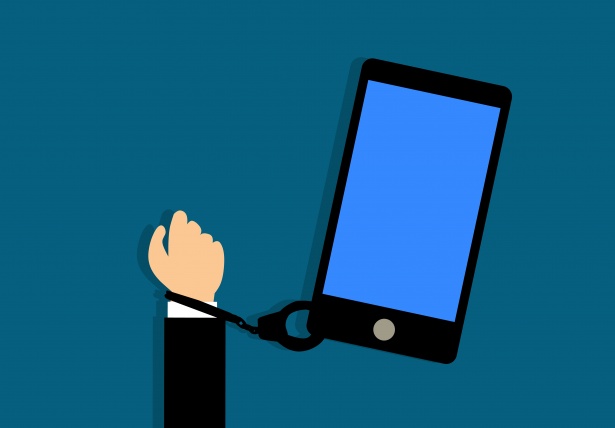Why Your Phone Is So Addictive
Phones trap us in an addictive state of constant attachment. Photo courtesy of Pixabay.
September 18, 2019
In this day and age, technology is a major part of how we live. Technological advances have improved so many aspects of life, but with these advances came smartphones. Our generation is the first to grow up with smartphones, and it shows. The minds of young people like students at Charlottesville High School are being rewired by smartphones and social media.
When interviewed, multiple C.H.S. students acknowledge that they are addicted to their phones. When asked why she thought she was addicted to her phone, 9th grader Claire DeGuzman responded, “because I dropped my phone in a lake and then didn’t know how to handle myself.” We spend so much time doing repetitive motions on our phones that, when we don’t have them, we feel like we are missing something.
Connor Rounsevell said he did not think he was addicted, but, when asked how many hours he spent on his phone a day, he said, “about 10.” Some people spend insane amounts of time on their phones, but still don’t see themselves as addicted. They feel like the amount of time they are spending is a conscious choice, and if they wanted to they could change it. It’s not until you are without your phone that you can see how attached you really are.
Young people are using social media and phones from such a young age, and their minds are still developing, so the impact is significantly larger. Actual brain scans show differences in our brains caused by phones. A huge behavioral difference phones are creating is attention problems. Many children struggle with some form of ADHD, but smartphones are further decreasing their ability to stay focused.
In this generation, we are surrounded by multiple screens basically everywhere. Because of this abundance of screens and entertainment, many teens find themselves, when watching a movie, wanting to check their phones simultaneously. Movies were created specifically to entertain, and they become bored with just that, so imagine the difficulty to focus on something like a lecture in class when their minds are trained to crave constant and multiple kinds of stimulation and entertainment.
A study at Harvard says this about social media platforms: “Facebook, Snapchat, and Instagram leverage the very same neural circuitry used by slot machines and cocaine to keep us using their products as much as possible.” Dopamine is a chemical that makes us feel good, motivating us to do the activities that are beneficial to our health and life. If you are wondering why you feel so good after exercise, dopamine is why. Many human-created addictive things are not beneficial but trick our mind into releasing dopamine anyways, such as drugs and gambling; social media does the exact same thing. Clever schemes such as likes or comments trick your brain with colorful displays and certain sounds that create dopamine, but also train your brain to crave that kind of stimulation.
Smartphones are addictive. It’s indisputable. Many people are aware that they are addicted, and spend way too much time on their phones. So if we know it’s bad, how do we stop? One of the best things you can do to retrain your brain to be less addicted to your phone is read. It’s simple, but it helps you regain control of your attention span, as well as helping develop the parts of your brain the phones damage. Disabling notifications for your social media platforms helps you not feel pulled to always check them. Turning on your screen time, so your phone tracks how much time you spend on what, is also a step to make yourself more aware.
If you feel like you aren’t addicted, try to put your phone somewhere out of sight for a few hours. Do you feel pulled to check to see what’s happening in your simulated social media world? Do you hear notifications when they aren’t really there? Are you counting the minutes until you can check your phone? If this describes you, maybe it’s time to reevaluate the situation and make a change.
















